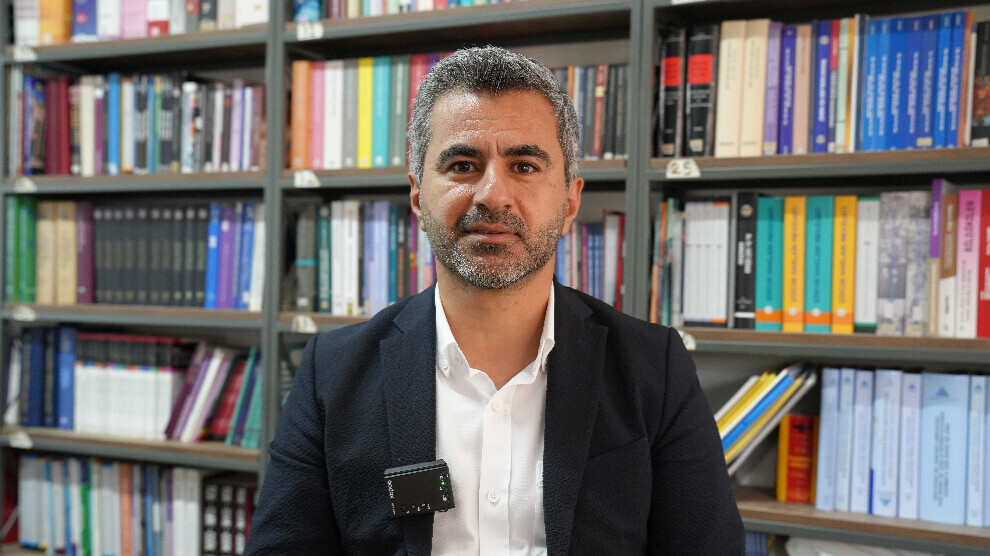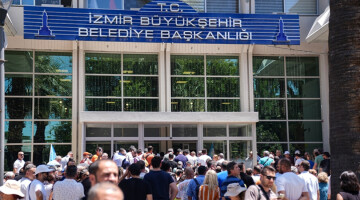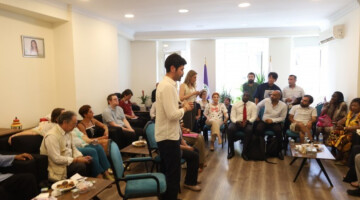In Amed (tr: Diyarbakır), civil society organizations, faith representatives, democratic mass organizations, and elected officials, primarily Kurdish political parties, came together to hold a “Unity Initiative” meeting.
The initiative was established by the joint decision of the delegates under the name “Democratic Unity Initiative” seeking “a fair, equal, and democratic solution to the Kurdish question and the democratization of Turkey.”
The Democratic Unity Initiative aims to carry out important work for the socialization of peace during the current intense period.
Nahit Eren, former president of the Diyarbakır Bar Association and member of the initiative, spoke to ANF about the current situation, the constitutional amendments on the agenda, and the steps that need to be taken.
Nahit Eren pointed out that the public is waiting for the state to take legal steps following the PKK's decision to lay down arms, saying, “The harsh and oppressive administration created by security-oriented policies must be eliminated. Legal regulations must be made in this regard. The new constitution must include all identities.”
Evaluating the new initiative on the peace process and the resolution of the Kurdish question, Nahit Eren said, “The process that began with Bahçeli's statements indicates that a different process awaits us at this stage.”
Eren noted that the decision made at the PKK Congress, following the rapid development of talks and Abdullah Öcalan’s call for the dissolution of the PKK, was well-received by society, adding, “It has sparked a sense of satisfaction regarding the resolution of the issue.”
Emphasizing that a peaceful solution requires a road map, Eren said, “If the issue is to be resolved through democratic and peaceful means, there are natural and normal steps that must be taken. This is what the whole society expects at the moment; the government and the state are expected to take steps.”
Eren added that it is inevitable for the state to take steps in line with this process, particularly in the legal, political, and social spheres, and said, “The state's perception of the Kurdish question as a security issue must change.”
Eren pointed out that the legal and bureaucratic system, which has been built on this perception for years, needs to transform itself in line with the new process, saying, "Thousands of politicians are currently in prison. There are issues in the social sphere that directly affect individuals due to the Kurdish issue. The president has made a statement that the trustee system will return to being an exceptional application, but this is not enough. The trustee system, which constitutes a direct intervention in the right to vote and be elected, must be abandoned. Large cities such as Van and Mardin are still governed by trustees. This policy must be ended."
According to Eren, Turkey's legal system needs to be reviewed: "There is a serious need for legal regulations regarding individual and collective rights that must exist in a democratic state governed by the rule of law. First, restrictive norms must be eliminated. Then, the expectations of the Kurdish community must be met on issues such as the definition of citizenship and education in the mother language. It is not possible to simplify and trivialize the solution to such a painful issue."
Stating that the end of the conflicts should be welcomed not only in the Kurdish regions but also in western Turkey, Eren warned that “provocative language is of no benefit to the country.”
Nahit Eren emphasized that the resolution process is not a matter that concerns only the Kurds but all the peoples in Turkey, saying, "There are rights, or rather facts, that are being demanded for all people living in this country. Discourse that provokes society must be abandoned, and contributions must be made to this process. The Kurdish people have been demanding peace for years, and so has Kurdish politics. Ultimately, the claim to live together in this country on the basis of equal citizenship is already an accepted understanding in today's world."
In other words, laying down arms and ending hostilities is an issue that should be viewed as highly significant and welcomed not only in the east of the country, not only in the Kurdish provinces, but also in western Turkey.
Eren also commented on the Democratic Unity Initiative, which brings together different political, social, and cultural groups in the region, saying, "We defined the Kurdish issue as a question of democracy, freedom, and status. We then sought to bring together the social dynamics that could contribute to a democratic and peaceful solution to this issue.
At this point, the secretariat of the initiative was established and is acting with equal representation. We also aim to carry out work to preserve the nature, language, and culture of the Kurds. I believe that such initiatives are important in terms of taking a position in the process."
Evaluating the process under four main headings, Eren emphasized that the first important heading was Devlet Bahçeli's statement: “It was very important to identify the right address for the resolution of the issue. It was an important call for the actors to play their roles in order for the process to reach a positive stage.”
Eren stated that the second heading referred to Abdullah Öcalan’s call, saying, “This call was very simple and very clear. It was important for the meetings with the delegations to resume and for the call to be answered. The PKK gave a clear response to this call with the decision it took at the congress.”
Nahit Eren concluded, "Now is the time to take new, but actually natural steps. If the arms have been laid down, the harsh and oppressive governance approach established through security policies must be eliminated. Legal regulations must be put in place to this end. The new constitution must encompass all identities. Very serious preparations must be made for constitutional change. Turkey's constitution must become a social contract that represents all the colors and identities of this country."











